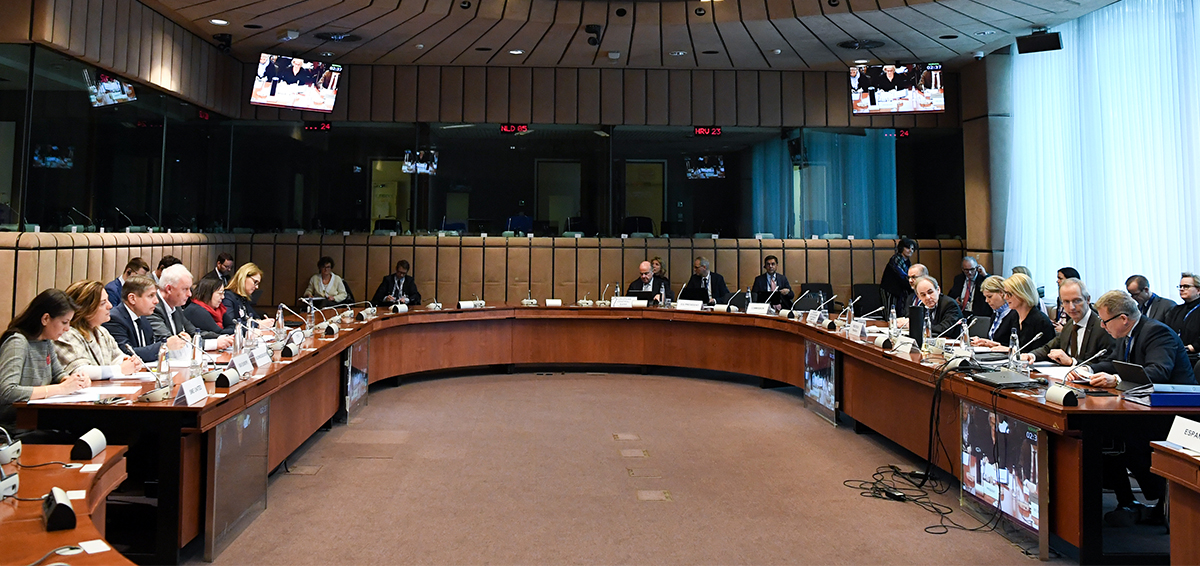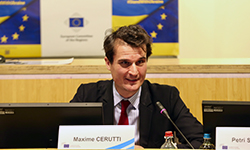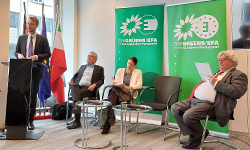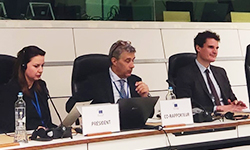BusinessEurope Headlines No. 2023-09
Europe’s competitiveness challenge requires a comprehensive response

The answer to Europe's competitiveness challenge is not a global subsidy race. Instead, we need a comprehensive EU response to initiatives such as the Inflation Reduction Act (IRA). This must address both long-term challenges such as high taxes, underdeveloped capital markets and a lack of investment in research and development, as well as the more pressing need to provide regulatory breathing space to businesses and support the transition to a green economy through targeted EU programmes and a more flexible and simpler state-aid framework. This was the message from BusinessEurope Director General Markus J. Beyrer at the Macroeconomic Dialogue, which brought together representatives from social partners and the European institutions on Monday 13 March. Beyrer also spoke about the short-term situation in the EU economy. He noted that whilst EU business sentiment has improved in recent months, the operating environment continues to be difficult given the high energy markets, tight labour markets, remaining supply chain strains and the prospects of further interest rate rises impacting both business and consumers.
Contact: Martijn Haas
Photo © Council of the European Union, 2023
Video message
Call for action to boost competitiveness and create regulatory breathing space
The EU business community calls on policy-makers to change course. For Europe to be the place to invest and do business, companies need regulatory breathing space. See our call for action for a #CompetitiveEU.
Modernised EU-Mexico agreement would support sustainable and green investments
 “The ratification process of the modernised EU-Mexico Global Agreement should be accelerated to ensure it is completed during this political cycle”, said BusinessEurope Director General Markus J. Beyrer to Rogelio Granguillhome Morfin, Ambassador of Mexico to the European Union, during their meeting on 10 March. The uncertain geopolitical context and the recent COVID crisis that affected supply chains make it more difficult for European companies to remain competitive while increasing their resilience. This is why BusinessEurope believes it is essential to complete the diversification process of supply chains with like-minded partners such as Mexico, both to support European competitiveness and to strengthen ties between the EU and North America. The meeting also offered an opportunity to exchange views on potential changes impacting the energy sector in Mexico, the country’s new Sonora Plan for Sustainable Development, as well as the new opportunities that the modernised agreement would open up to companies for green investments in the fields of renewable energies, electromobility and infrastructure.
“The ratification process of the modernised EU-Mexico Global Agreement should be accelerated to ensure it is completed during this political cycle”, said BusinessEurope Director General Markus J. Beyrer to Rogelio Granguillhome Morfin, Ambassador of Mexico to the European Union, during their meeting on 10 March. The uncertain geopolitical context and the recent COVID crisis that affected supply chains make it more difficult for European companies to remain competitive while increasing their resilience. This is why BusinessEurope believes it is essential to complete the diversification process of supply chains with like-minded partners such as Mexico, both to support European competitiveness and to strengthen ties between the EU and North America. The meeting also offered an opportunity to exchange views on potential changes impacting the energy sector in Mexico, the country’s new Sonora Plan for Sustainable Development, as well as the new opportunities that the modernised agreement would open up to companies for green investments in the fields of renewable energies, electromobility and infrastructure.
Contact: Eleonora Catella
Enhancing skills and circular migration between the two shores of the Mediterranean
 Access to an appropriately skilled workforce is a key factor of a company’s competitiveness and an important challenge on both sides of the Mediterranean. We welcome the European Commission’s decision to make 2023 European Year of Skills. In the context of the Union for Mediterranean (UfM) cooperation on employment and social issues, a more coherent, consistent and effective approach towards the development of circular migrations with mutual benefits for the countries of origin and the host countries can play a positive role. This includes putting in place the direct referencing of third country qualifications, starting with the key Mediterranean countries of origin, to the European Qualifications Framework. These were the key messages conveyed by BusinessEurope at the 14th UfM regional platform gathering Labour Ministries, the European Commission and the UfM regional social partner organisations in Nice on 14-15 March 2023. The UfM social partners will meet later this year at the 5th UfM Social Dialogue Forum on 21-22 November 2023 in Marseille.
Access to an appropriately skilled workforce is a key factor of a company’s competitiveness and an important challenge on both sides of the Mediterranean. We welcome the European Commission’s decision to make 2023 European Year of Skills. In the context of the Union for Mediterranean (UfM) cooperation on employment and social issues, a more coherent, consistent and effective approach towards the development of circular migrations with mutual benefits for the countries of origin and the host countries can play a positive role. This includes putting in place the direct referencing of third country qualifications, starting with the key Mediterranean countries of origin, to the European Qualifications Framework. These were the key messages conveyed by BusinessEurope at the 14th UfM regional platform gathering Labour Ministries, the European Commission and the UfM regional social partner organisations in Nice on 14-15 March 2023. The UfM social partners will meet later this year at the 5th UfM Social Dialogue Forum on 21-22 November 2023 in Marseille.
Contact: Anna Kwiatkiewicz
EU economic governance reform: agreement on new fiscal rules urgently needed
 BusinessEurope has published its position paper on the reform of the economic governance framework proposed by the European Commission in November 2022. We support the Commission proposals to simplify the fiscal rules and to encourage growth-enhancing public investment and structural reforms, noting that strong public finances are fundamental for business confidence and investment. But the new framework will require improved enforceability, as well as strict monitoring of the implementation of structural reforms. Given the high debts taken on by governments over the past two years of crisis, agreement on new fiscal rules is urgently needed ahead of Member States setting their 2024 budgets.
BusinessEurope has published its position paper on the reform of the economic governance framework proposed by the European Commission in November 2022. We support the Commission proposals to simplify the fiscal rules and to encourage growth-enhancing public investment and structural reforms, noting that strong public finances are fundamental for business confidence and investment. But the new framework will require improved enforceability, as well as strict monitoring of the implementation of structural reforms. Given the high debts taken on by governments over the past two years of crisis, agreement on new fiscal rules is urgently needed ahead of Member States setting their 2024 budgets.
![]() Contact: Martijn Haas
Contact: Martijn Haas
Year of Skills: improving the performance of training systems
 Initiatives under the European Year of Skills should help facilitate a coordinated approach to the update of education and training curriculum related to new and emerging labour market needs. The European Year of Skills should help to identify effective solutions to improve the performance of national training systems. In particular, it is important to better involve employers in this process because they know best what are the changing job requirements in the context of the digital and green transitions. This was a key message given by Maxime Cerutti, BusinessEurope Director for Social Affairs, during a European Economic and Social Committee conference on the Year of Skills that took place on 10 March. It is also important to use the momentum generated by the Year to further work on issues related to skills anticipation and matching, which are important elements to make Europe more attractive to third country talents with the development of the full version of the EU Talent Pool in the coming year.
Initiatives under the European Year of Skills should help facilitate a coordinated approach to the update of education and training curriculum related to new and emerging labour market needs. The European Year of Skills should help to identify effective solutions to improve the performance of national training systems. In particular, it is important to better involve employers in this process because they know best what are the changing job requirements in the context of the digital and green transitions. This was a key message given by Maxime Cerutti, BusinessEurope Director for Social Affairs, during a European Economic and Social Committee conference on the Year of Skills that took place on 10 March. It is also important to use the momentum generated by the Year to further work on issues related to skills anticipation and matching, which are important elements to make Europe more attractive to third country talents with the development of the full version of the EU Talent Pool in the coming year.
Contact: Robert Plummer
Debating EU-Taiwan economic relations
 “Taiwan is a crucial link in the supply chains of many European companies, particularly regarding semiconductors, as the island produces over 90% of the world’s most advanced chips”, said Benedikt Wiedenhofer, Adviser in the International Relations Department of BusinessEurope at a roundtable discussion on EU-Taiwan trade on 9 March. The event, hosted by MEP Reinhard Bütikofer, aimed at exploring pathways towards enhanced economic relations between the EU and Taiwan. Professor Markus Taube from the University of Duisburg-Essen presented his recent study "EU-Taiwan Resilient Supply Chain Agreement". Adeline Hinderer, Head of Unit “Far East” of the Directorate General for Trade of the European Commission, and Wiedenhofer were invited to react to his presentation. Wiedenhofer concluded that there certainly is still a lot of scope for deepening EU-Taiwan economic relations. “We believe that the best way for the EU to ensure a sustainable and mutually beneficial outcome on this is by intensifying its technical cooperation with Taiwan and striving for concrete deliverables that address technical barriers that companies on both sides face”, he said.
“Taiwan is a crucial link in the supply chains of many European companies, particularly regarding semiconductors, as the island produces over 90% of the world’s most advanced chips”, said Benedikt Wiedenhofer, Adviser in the International Relations Department of BusinessEurope at a roundtable discussion on EU-Taiwan trade on 9 March. The event, hosted by MEP Reinhard Bütikofer, aimed at exploring pathways towards enhanced economic relations between the EU and Taiwan. Professor Markus Taube from the University of Duisburg-Essen presented his recent study "EU-Taiwan Resilient Supply Chain Agreement". Adeline Hinderer, Head of Unit “Far East” of the Directorate General for Trade of the European Commission, and Wiedenhofer were invited to react to his presentation. Wiedenhofer concluded that there certainly is still a lot of scope for deepening EU-Taiwan economic relations. “We believe that the best way for the EU to ensure a sustainable and mutually beneficial outcome on this is by intensifying its technical cooperation with Taiwan and striving for concrete deliverables that address technical barriers that companies on both sides face”, he said.
Contact: Benedikt Wiedenhofer
Economic freedoms and social fundamental rights: proportionality needed
 Fifteen years ago, the Viking and Laval rulings of the European Court of Justice created a controversial debate around the relationship between economic freedoms and social fundamental rights. Since then, the posting of workers directive has been revised in 2018, making it possible for trade unions to use their right to take collective action to apply the principle of “equal pay for equal work at the same place”, which was introduced in the revised posting directive. In this context, there is no need for a social progress protocol to be annexed to the EU Treaty. A proportionality requirement is necessary to ensure that exercise of this right by trade unions does not unfairly hollow out enterprises’ freedoms to establish or provide services in another Member State, or exclude foreign service providers from any national market. These were the key messages conveyed by Maxime Cerutti, BusinessEurope Director for Social Affairs, at the public hearing on “Social Progress in the EU: Time for a European Social Progress Protocol?”, organised by the European Economic and Social Committee on 14 March.
Fifteen years ago, the Viking and Laval rulings of the European Court of Justice created a controversial debate around the relationship between economic freedoms and social fundamental rights. Since then, the posting of workers directive has been revised in 2018, making it possible for trade unions to use their right to take collective action to apply the principle of “equal pay for equal work at the same place”, which was introduced in the revised posting directive. In this context, there is no need for a social progress protocol to be annexed to the EU Treaty. A proportionality requirement is necessary to ensure that exercise of this right by trade unions does not unfairly hollow out enterprises’ freedoms to establish or provide services in another Member State, or exclude foreign service providers from any national market. These were the key messages conveyed by Maxime Cerutti, BusinessEurope Director for Social Affairs, at the public hearing on “Social Progress in the EU: Time for a European Social Progress Protocol?”, organised by the European Economic and Social Committee on 14 March.
Contact: Maxime Cerutti
Calendar 
- 23-24 March: ERA Annual Conference on European Labour Law 2023
- 18 April: VAT in the digital age: digital / real-time reporting - Implications for businesses and compliance processes
- 6 June: Reuters Event: Responsible Business Europe 2023
- 14-15 June: International IP Enforcement Summit
- 19-20 June: TDI23 – Day of Industry
Not yet a subscriber? Register here.
Reminder: please have a look at our privacy policy